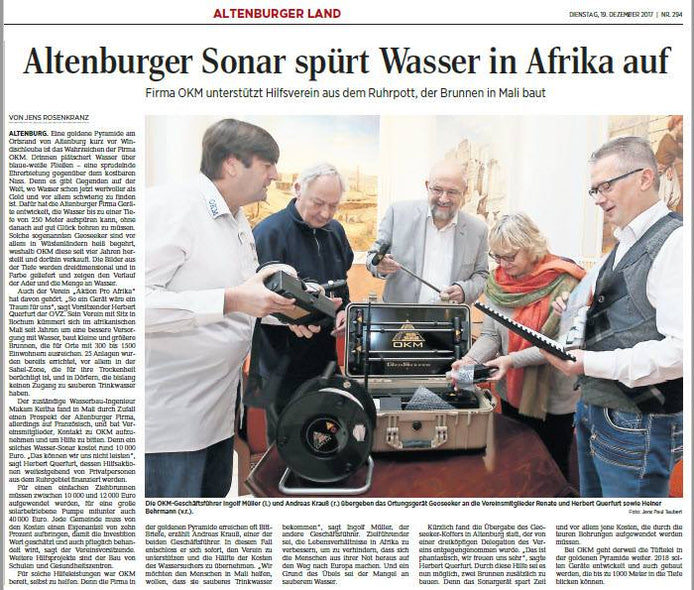
The Fight against Water Scarcity
Explore Water Detection with OKM Detectors
OKM Detectors: Bridging the Gap in the Crisis of Water Scarcity
Water scarcity is one of the most far-reaching and serious impacts of climate change, and already millions of people around the world lack direct access to fresh drinking water. Humanitarian organizations and geologists are using water detectors to locate underground water reservoirs and aquifers that were previously hidden from view. The innovative OKM technologies effectively assist in water detection, cavity detection and further ground investigations.
In Africa alone, more than 300 million people lack adequate drinking water supplies and rely on human aid organizations for assistance. Droughts, intensified by climate change, are fostering increasingly rapid desertification, reduced soil fertility, lower groundwater levels and drying up water resources. According to an estimate by the U.N. Development Assistance Program, as many as 1.8 billion people worldwide will suffer from direct water shortages by 2080. Technological water detection is becoming an increasingly important tool for finding and accessing new sources.
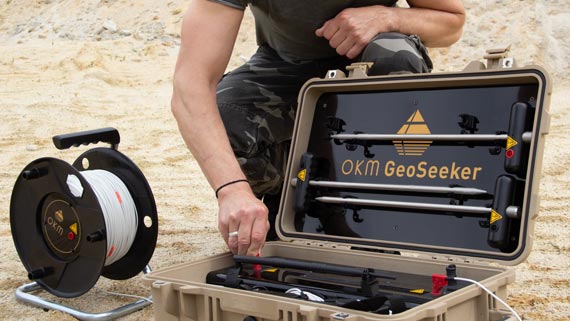
Facilitating Water Detection with Water Detectors
Scientists emphasize that - in addition to effective and comprehensive measures against climate change - water scarcity can be effectively reduced primarily with new technological and innovative tools for water detection. These include water detectors such as those from OKM, which can effectively facilitate water search, cavity detection and ground investigation using a Schlumberger-based geoelectrical measurement method.
 TECHNOLOGY & INNOVATION
TECHNOLOGY & INNOVATION
 USER-FRIENDLINESS
USER-FRIENDLINESS
 TRANSPARENCY & TRUST
TRANSPARENCY & TRUST
 DURABILITY, RELIABILITY & QUALITY
DURABILITY, RELIABILITY & QUALITY
 SERVICE WORLDWIDE
SERVICE WORLDWIDE
 DETECTABLE STRUCTURES
DETECTABLE STRUCTURES
 LANGUAGE-INDEPENDENT USE
LANGUAGE-INDEPENDENT USE
 DETECTION DEPTH
DETECTION DEPTH
Supporting Water Detection for Human Aid Organizations And Geologists
Today, aid organizations and geologists are already using water detectors in countries such as Kenya, Ethiopia and Mali to locate underground lakes, known as aquifers, and previously hidden ground water resources. Ground investigation for water detection and cavity detection, such as by the OKM GeoSeeker, determines the exact soil resistance and thereby indicates whether water deposits exist in the underground. Aid organizations can then initiate further measures to access the precious sources.
OKM GeoSeeker Supports Aid Organizations in Mali in the Search for Water
Back in December 2017, OKM handed over a GeoSeeker to the aid organization "Aktion Pro Afrika e. V." in Mali, which has since been used successfully to search for water and cavities. The exact execution of the measurements and the simple and flexible handling of the OKM GeoSeeker facilitate the water detection of the aid organizations enormously and save the experts other lengthy and complex processes for soil investigation.
Innovative Technology Optimizes Success in Water Detection
Both the OKM GeoSeeker and OKM GeoSeeker Mini feature innovative technology for water detection, cavity detection and soil investigation. Three measurement methods are possible with the pre-installed software applications:
- In the Active measurement, current is conducted into the ground via two electrodes and, with the help of two additional electrodes, the voltage drop is measured at previously defined measuring points. Accurate measurement is considered to be very precise and is ideal for water search, cavity search and soil investigation. If the search is to be carried out more quickly, a fast Active measurement can also be carried out.
- The Passive measurement is mainly used to detect flowing water in the subsurface during the water detection. No current is conducted into the ground, but the electrodes detect the naturally occurring voltage during the ground exploration.
Both the OKM GeoSeeker and the OKM GeoSeeker Mini are optimally equipped for water detection, cavity detection and soil investigation. Both water detectors have a color display, internal memory, multi-language operation, a rechargeable high-performance battery, and use an innovative geoelectric measurement method based on the Schlumberger process.
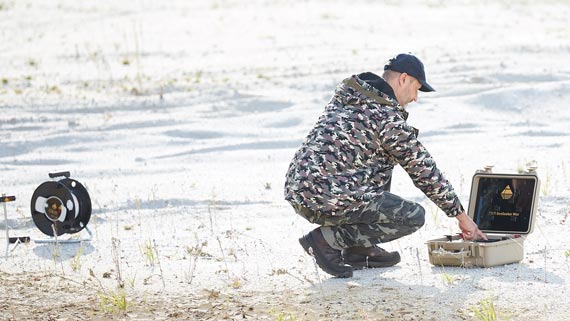
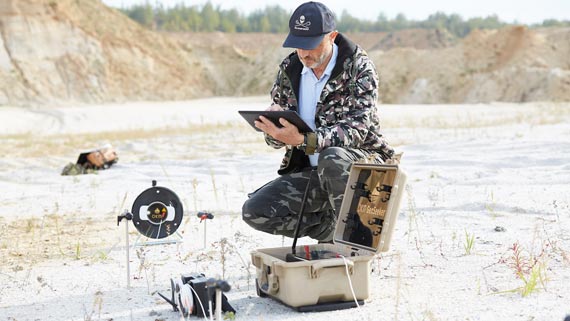
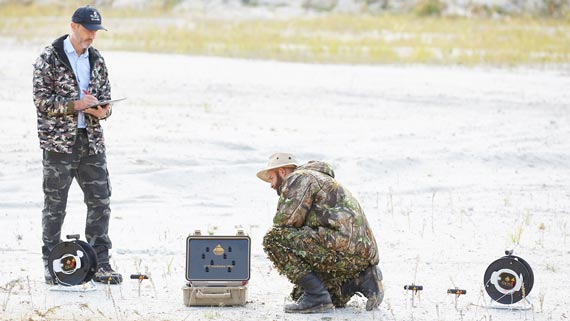
Compact GeoSeeker Mini for fast and flexible Water Detection by Human Aid Organizations
The advantages of the GeoSeeker Mini lie primarily in its effective handiness and very simple operation. By means of precise, step-by-step and pictorial instructions on the color display, employees of relief organizations, workers in the agricultural and construction industries or private persons can be instructed in soil investigation and operate the water detector even without much previous knowledge. The handy, compact device is easy to transport and is ready to work in just a few steps.
This makes the OKM GeoSeeker Mini particularly suitable for field work by aid organizations that want to quickly and flexibly carry out a water and cavity detection in an extensive area, but also for private and commercial use if you are looking for a new water source on your property.
OKM Detectors are trusted by professionals worldwide.
Use OKM GeoSeeker for Comprehensive Water and Cavity Detection
When searching for water, OKM GeoSeeker can detect and visualize soil resistivity up to a depth of 820 ft (250 m) during soil investigation. The measured values are very accurate and are displayed in comprehensive 3D graphics, allowing accurate conclusions to be drawn during water detection, cavity detection and soil investigation.
The advancing climate change and the accompanying increasing water scarcity require better and newer technologies to optimize the finding and development of new water sources. With our water detectors OKM GeoSeeker and GeoSeeker Mini we want to contribute to facilitate the water detection and to equip institutions, private persons and relief organizations with the best possible instruments for water detection, cavity detection, soil investigation or brewing ground investigation.
Find underground water deposits, water-bearing gravel, and cavities down to 250 m (820 ft) depth with OKM Water Detectors.
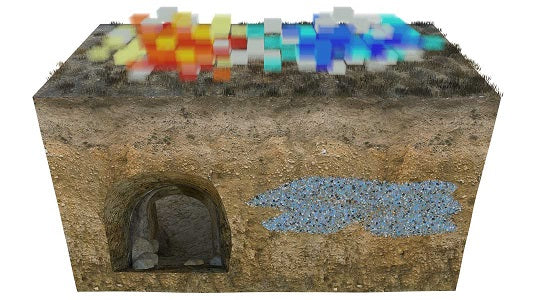
Get your Personal Consultation
Are you interested in our water detectors or do you have any questions about application possibilities, operation or technology? Contact us - we will be glad to help you! Our experts show you how to detect buried target structures down to 25 m (82 ft) depth and underground water deposits down to 250 m (820 ft) deep.
info@okmdetectors.com
+49 3447 499 3000
+49 162 4192 147
Julius-Zinkeisen-Str. 7
04600 Altenburg
Germany



